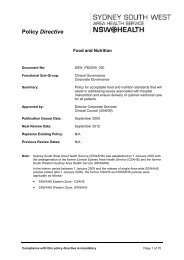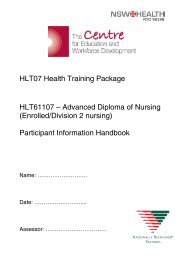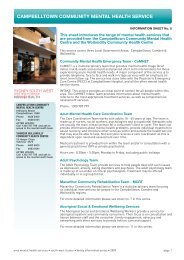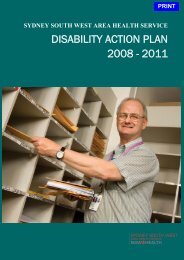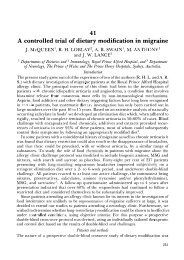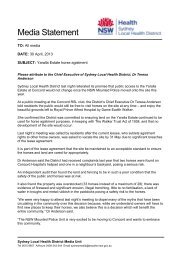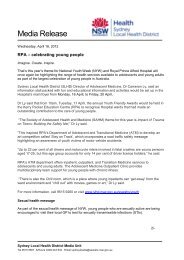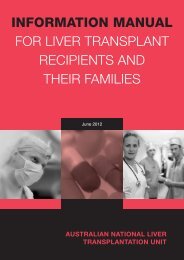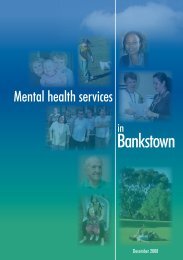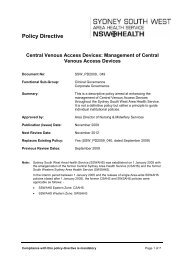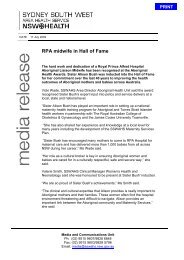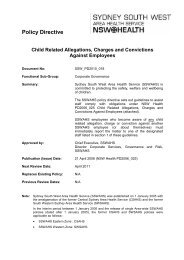Aged Care & Rehabilitation Clinical Services Plan 2007 – 2012
Aged Care & Rehabilitation Clinical Services Plan 2007 – 2012
Aged Care & Rehabilitation Clinical Services Plan 2007 – 2012
Create successful ePaper yourself
Turn your PDF publications into a flip-book with our unique Google optimized e-Paper software.
<strong>Aged</strong> <strong>Care</strong> & <strong>Rehabilitation</strong> <strong>Clinical</strong> Service <strong>Plan</strong> <strong>2007</strong> - <strong>2012</strong>the opportunity for patients to be assessed appropriately at an early stage in their inpatient stay andto commence an integrated multidisciplinary rehabilitation program, concurrent with ongoing acutemedical management. Such early intervention from <strong>Rehabilitation</strong> Specialists and the rehabilitationteam, assists in preventing or minimising secondary disability as a result of hospitalisation. It mayalso reduce hospital lengths of stay, through early and appropriate intervention and the prevention ofde-conditioning. Current evidence suggests that early rehabilitation in particular, results in improvedfunctional outcomes. Further, the availability of this service streamlines the transfer of patients fromacute care to sub-acute/rehabilitation services, at the conclusion of their acute episode.2005/06 ActivityData on rehabilitation inpatient consultation for 2005/06 is not available consistently across the Areaand as such, has not been reported.Current and Emerging IssuesEmerging models of care – the delivery of community based services for the treatment of chronicillness, and alternative settings for the delivery of therapy services, may reduce inpatient demand.Projected Future ActivityInpatient consultation activity will increase in line with the growth and ageing of the population. Thenumber of <strong>Rehabilitation</strong> Specialist and therapist positions should also increase consistent with thischange in demographics.Future Model of <strong>Care</strong><strong>Rehabilitation</strong> Consultancy <strong>Services</strong> should continue to be provided to all hospitals. Patients will beprioritised and referred for inpatient or community based rehabilitation services, based on theirneeds and potential for positive rehabilitation outcomes.Recommendation – <strong>Rehabilitation</strong> Inpatient Consultation ServiceExpand the capacity of inpatient rehabilitation consultation services consistent with populationgrowth and ageing6.2.4 Dementia and Gerontology <strong>Clinical</strong> Nurse ConsultantsDementia and Gerontology <strong>Clinical</strong> Nurse Consultants (CNCs) provide expert advice, support andeducation to staff and patients regarding issues relating to the aged care client, such as dementia,delirium and falls. In SSWAHS hospitals, there are various Dementia and/or Gerontology CNCpositions.NSW Health has funded two fixed term Dementia CNC positions (one for each end of the Area) untilJuly 2008. One Dementia CNC position is based at Bankstown Hospital with responsibility for thesouth west. The second CNC is based at Canterbury Hospital and provides assistance to RPAHand Balmain Hospitals as required. The role of the Dementia CNC is to work with other clinicians tobetter manage people with delirium/dementia in the acute setting and to reduce complicationsassociated with hospital stays through education and modeling care. Through the third StateDementia <strong>Plan</strong>, NSW Health is seeking to obtain recurrent funding for these positions. Funding hasnot yet been confirmed.Gerontology CNCs are based at Concord Repatriation General and Bowral Hospitals.2005/06 ActivityCNC activity is captured within larger data sets and as such cannot be clearly identified.Current and Emerging Issues• Population ageing – The population aged 85+ years will increase by almost 100% by 2016. Asthe population continues to age rapidly, there will be an increase in demand from older people,particularly frail older people;• Prevalence of dementia – the prevalence of dementia is expected to double by 2016.Particular expertise will be required to assist clients with dementia;• Delirium – older patients are at particular risk of developing delirium as a result of an inpatientepisode. Patients with delirium have a longer length of stay and a greater risk of falls than otherpatients. As the number of older patients increases, expert resources will be needed to identifyand manage delirium in the inpatient setting;Page 56




